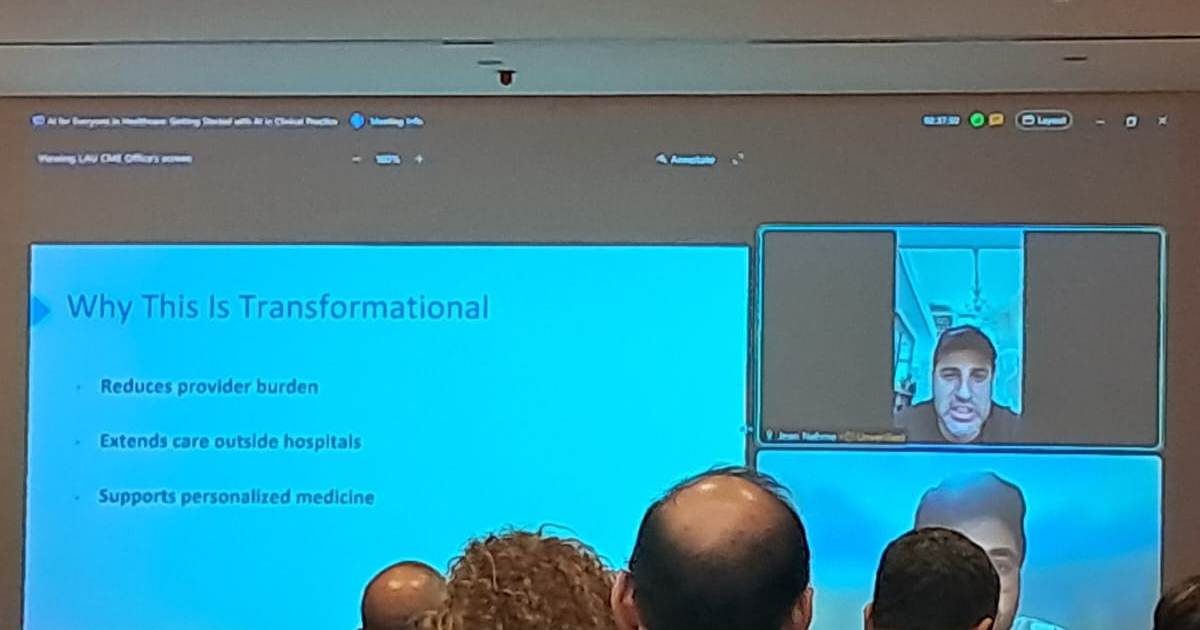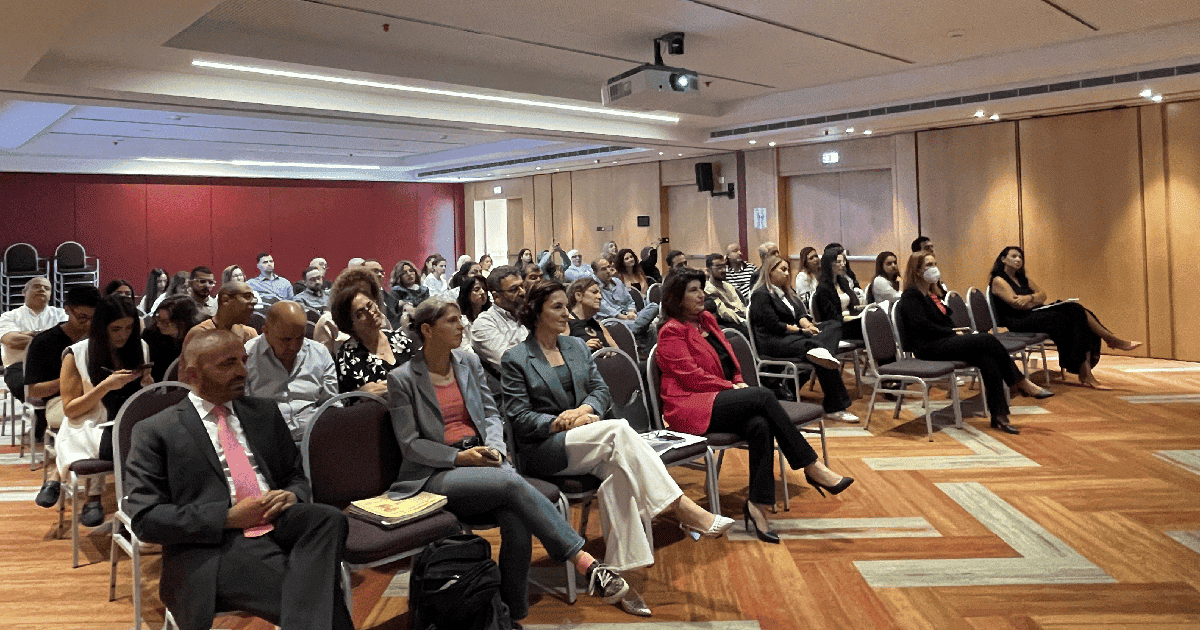AI in Clinical Practice: Tools, Ethics, and the Human Touch
The LAU Gilbert and Rose-Marie Chagoury School of Medicine convened physicians, scientists, and healthcare professionals to assess the evolving clinical use of AI and the ethical challenges it poses in patient care.
As artificial intelligence (AI) revolutionizes the world, the Office of Continuing Medical Education at the LAU Gilbert and Rose-Marie Chagoury School of Medicine hosted a cross-disciplinary event to explore how it is transforming healthcare, education, and research, and how clinicians can actively shape that transformation.
Titled AI for Everyone in Healthcare: Getting Started with AI in Clinical Practice, the event on June 14, 2025, at the LAU Medical Center–Rizk Hospital brought together experts from across the medical and technological spectrum.
Setting the tone for the day, Associate Dean for Faculty Affairs and Development Vanda Abi Raad welcomed participants with a message that balanced innovation with humanity: “The goal today is to show how AI can support—not replace—healthcare professionals, and how together, we can guide its integration with both compassion and wisdom.”
The program opened with Dr. Jordan Srour, LAU’s assistant provost for educational resources and innovation, who led an interactive session on the history and evolution of AI. She unpacked key concepts—machine learning, generative models, and the ongoing tension between performance and transparency—to help demystify the technology.
“Bias can infiltrate every stage of an AI model’s lifecycle, from data collection to algorithm design,” she cautioned, emphasizing the importance of close collaboration between clinicians and data scientists to ensure fairness and inclusivity. She further explained how machine learning can not only detect but also correct for bias, allowing systems to evolve through feedback and improved data strategies.
With this conceptual groundwork laid, the conversation moved from theory to practice. Faculty members across disciplines showcased how AI is already reshaping clinical workflows in radiology, ophthalmology, and pathology.
On the use of AI in radiology, Acting Chair of the school’s Department of Diagnostic Imaging and Interventional Therapeutics Daniel Mahfoud presented compelling cases where it is accelerating diagnostic speed and precision. From real-time stroke assessments that help identify salvageable brain tissue to oncology applications that quantify tumor volumes and predict risk, Dr. Mahfoud illustrated the clinical value of intelligent tools.
“AI is a game changer,” he said. “We should not be afraid. We should integrate, adopt, and adapt it,” underscoring, nevertheless, the ethical challenges it poses, such as the risk of overdiagnosis and the potential dangers of applying models trained on non-representative populations.
Clerkship Director of the Department of Ophthalmology Karim Sleiman offered similar insights from ophthalmology, a field naturally aligned with AI due to its abundance of structured imaging data. He showed how AI is already enhancing lens calculations in cataract surgery, refining retinal scans, and enabling earlier detection of diseases such as macular degeneration, sometimes flagging subtle fluid changes that even seasoned clinicians might overlook.
LAU medical student Mazen Hammoud presented on practical steps to make data minable by AI in one of most important talks at the event.
Continuing the theme of AI as a clinical ally, Chair of the Department of Pathology Selim Nasser explored its growing role in digital pathology, reducing diagnostic delays by improving the speed and accuracy of tissue sample analysis. While the outputs are often impressively accurate, however, the “black box” nature of many AI tools, which renders the logic behind them opaque, raises serious questions about transparency and trust, he warned.
The day’s keynote speaker, Dr. Jean Nehme, Lebanese entrepreneur, co-founder of Touch Surgery, and plastic surgeon at Imperial College London, expanded the discussion from current applications to what lies ahead. “AI is no longer science fiction,” he stated. Tracing the arc from oral knowledge to textbooks, search engines, and now to agentic AI systems that can make decisions and take action, he stressed that these tools are not just reactive but increasingly capable of reasoning.
“Computers are going to become reasoning machines,” Dr. Nehme said, “they are going to make decisions that won’t just be prediction-based.”
In a live demonstration, Dr. Nehme was joined by Med IV student Anthony Abou Mrad from the American University of Beirut, who walked the audience through building a voice-activated healthcare scheduler using a no-code platform. The demo provided a glimpse into a future where advanced AI tools are even accessible to non-technical users.
Rounding out the academic portion of the event, Dr. Joseph Stephan, director of LAU’s Institutional Review Board and Research Ethical Compliance, turned the spotlight to ethics and regulation. He urged the audience to look beyond the comfort of familiar metrics, such as accuracy.
“A model can be 99 percent accurate and still miss every true positive case,” he warned. Instead, he advocated for metrics that provide different percentages for precision and F1 score (a measure used to evaluate the performance of a machine learning model, especially in classification tasks), and a fuller picture of model performance, especially vital in sensitive areas like cancer detection.
Dr. Stephan also highlighted rising regulatory expectations, particularly in Europe, for AI systems to be explainable, auditable, and accountable. “The question isn’t whether AI will be part of healthcare,” he concluded. “The question is: how do we integrate it responsibly?”
Looking ahead, the school, in collaboration with the LAU Center for Innovative Learning will launch an AI certificate program next fall, specifically designed for healthcare professionals with limited technical backgrounds, that offers a structured, hands-on introduction to AI tools and their practical applications in clinical settings.

